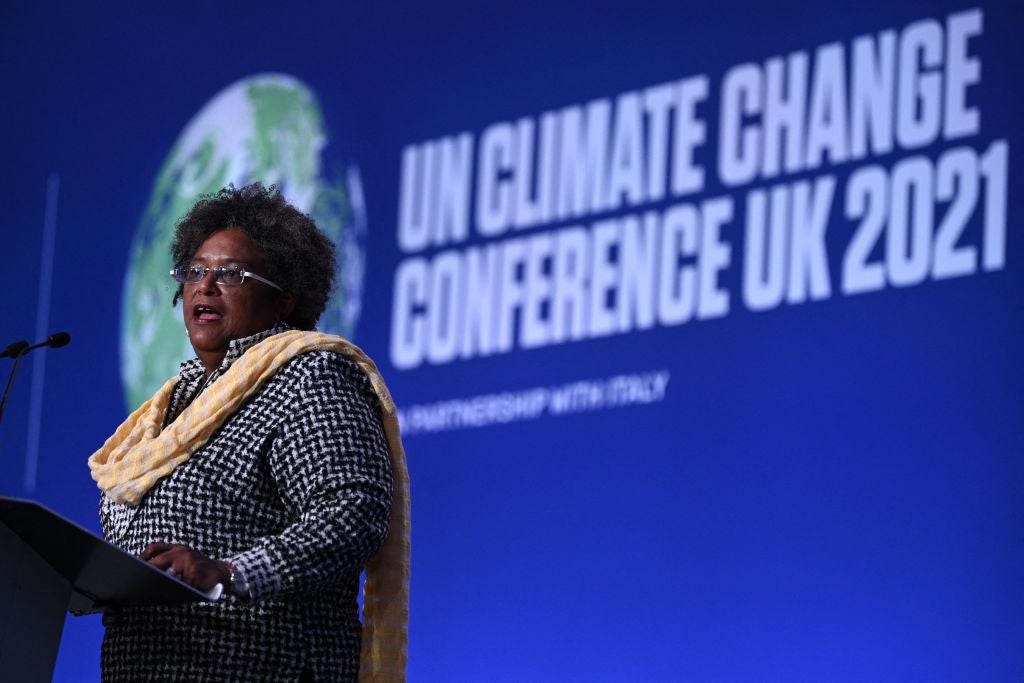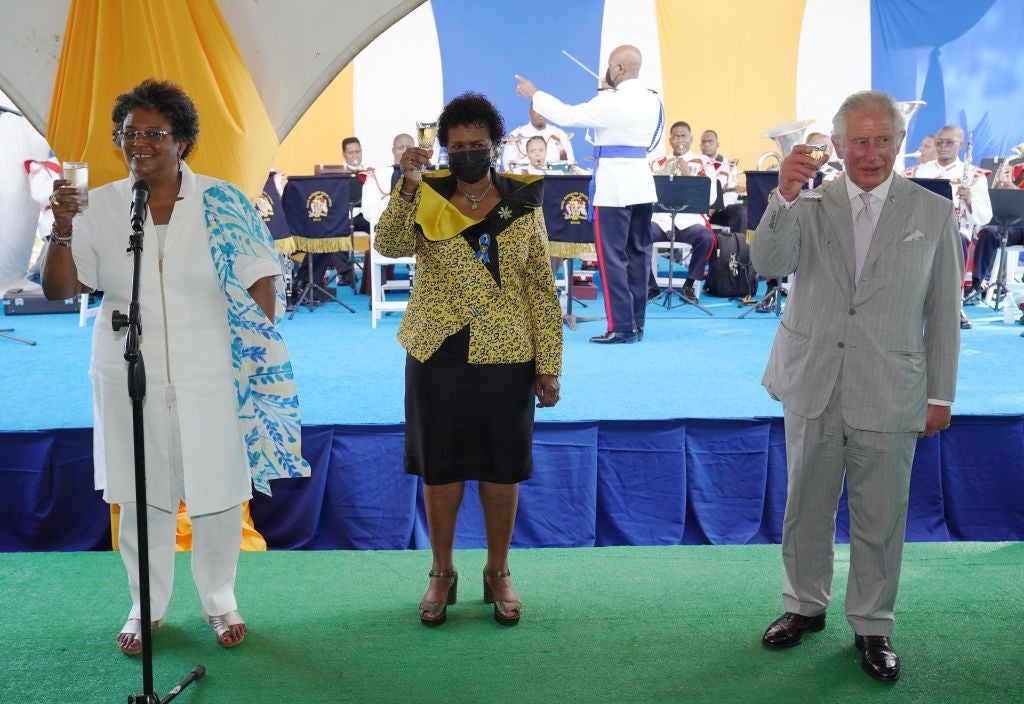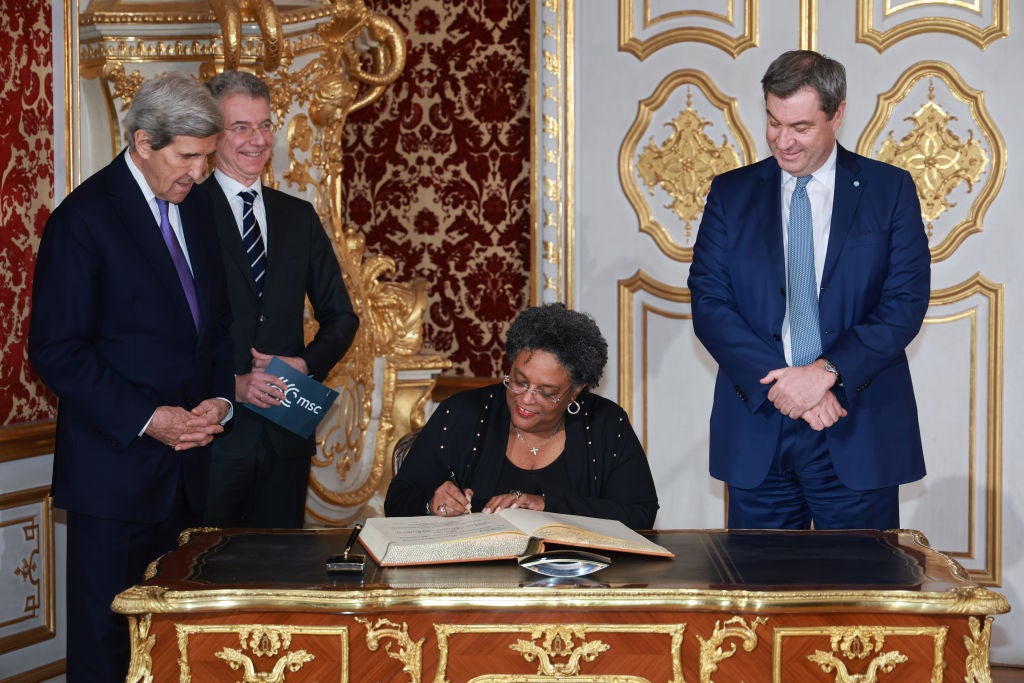“This is not science fiction, this is our reality,” Barbados Prime Minister Mia Mottley has repeatedly said in addresses around the world.
She has spoken out about the current climate situation, and her words and actions have matched her, quickly becoming one of the world’s most prominent voices on the seriousness of the problem.
She has set ambitious goals for Barbados, including eliminating fossil fuel use by 2030, envisions installing solar panels on every home on the island, and plans to restore coral reefs and plant one million trees.
Mottley is a former lawyer who holds a law degree from the University of London and studied at the London School of Economics, but politics is pretty much in her DNA, as her grandfather, Ernest Deighton Mottley, was Bridgetown’s first mayor and was knighted in the 2019 New Year’s Eve honours, and her uncle (named after him) was a political leader in the Christian Social Democrats.
She began her political career in 1991, becoming one of the youngest Bahamians to hold a ministerial position, aged just 29. She was subsequently appointed Minister of Education, Youth and Culture in 1994 (a position she held until 2001), and was elected Secretary-General of the Barbados Labour Party in 1996.

Since becoming the country’s eighth Prime Minister in 2018, Mottley has achieved a number of firsts. Not only is she the first woman to lead the country, but she is also the first female Prime Minister since Barbados became a republic in November 2021 (a position she helped drive), and she is the first Barbadian to appear on the cover of the 2020 edition. time magazine.
Beyond these milestones, she has solidified herself as a pioneering leader and has quickly become known for her eloquent, urgent and powerful speeches since announcing the Bridgetown Initiative at the opening ceremony of the COP26 Climate Summit in November 2021.
The initiative champions poorer countries that bear the greatest physical and economic burdens from the climate crisis, yet have the lowest emissions: Barbados accounted for less than 0.01% of global emissions in 2020.
“We have the means to invest in protecting the most vulnerable people on the planet from climate change, but we choose not to do so — not because we don’t have enough money, but because we don’t have the will to distribute what we have,” Mottley said at the United Nations in September 2021.
“Our world does not know what it is betting on. If we do not control this fire, we will all burn,” she continued, quoting a Bob Marley lyric and asking pointedly, “Who will stand up for the rights of our people?”

The following year, at COP27 in Egypt, she told leaders of the world’s richest countries that failure to do better was a “death sentence” for small island and developing nations. Independent Reported previously.
To counter the lack of action, the Bridgetown Initiative is spearheading reform of global finance, aiming to rebalance the gap between rich and poor countries in their ability to address and adapt to the effects of the climate crisis.
This initiative will put Barbados at the forefront of addressing the gaps in response to the climate crisis that are rooted in Barbados (and other island nations) vulnerability. A cornerstone of Mottley’s plan is to cap or forgive the debt of “climate-damaged countries.”
Those on the climate frontline are most at risk from rising sea levels, as well as extreme weather disasters like floods, hurricanes, coastal erosion and drought. And while rich countries typically have debt service rates around 1-4%, poor countries face staggering rates of 12-14% because they are considered riskier lenders.

These high interest rates severely impede repayment capacity, especially when combined with the need to rebuild homes, hospitals and schools after major disasters. In developing countries, the cost of responding to climate-related natural disasters is estimated at $70 billion per year, but could rise to $300 billion by 2030.
Mottley sees the Bridgetown Initiative as working in the same way that Europe’s debt ceilings allowed countries to rebuild after World War II. Without this approach to addressing the gap in inequality and outdated repayment structures, he says it will be nearly impossible for vulnerable countries to truly combat the climate crisis.
The initiative also calls for wealthy countries, which account for four-fifths of global emissions, to pay more to help poorer countries resilient to climate change.
“Our people are watching and they are paying attention,” she told world leaders from the stage at COP26 in Glasgow.
“Are we really going to leave without addressing the ambition that so desperately needs to save lives and save the planet? Or have we become so blind and stubborn that we can no longer understand the cry of humanity?”
The Independent newspaper Climate 100 List We will be holding an online event in New York in September.







